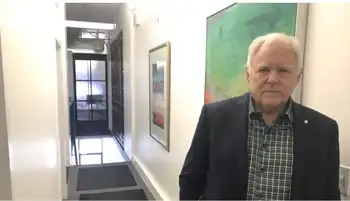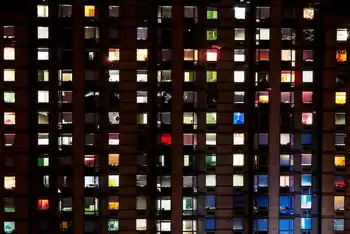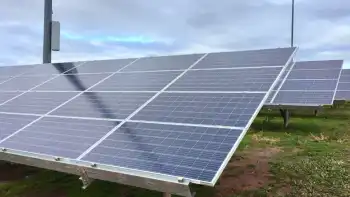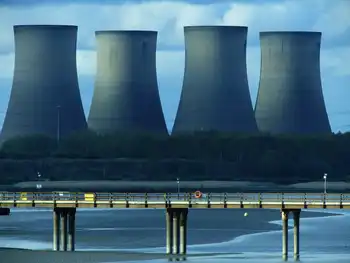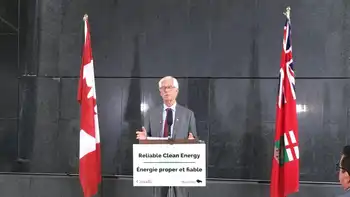Search for green power on and off the grid
By NPR
CSA Z462 Arc Flash Training - Electrical Safety Essentials
Our customized live online or in‑person group training can be delivered to your staff at your location.

- Live Online
- 6 hours Instructor-led
- Group Training Available
"It has a little turbine inside: The flow of water regenerates power to the battery itself. It's a little hydroelectric plant right here," Bell says.
And when an entrepreneur offered Bell a chance to buy clean electricity for his office — and save money on power — he saw it as another chance to practice what he preaches.
"This allows us to have 100 percent wind power energy, which is good for the environment, and allows us to reduce our costs, which is good for our bottom line," Bell says.
Hundreds of utilities around the country — and a growing number of companies — are offering customers a chance to buy green power. These programs are especially popular with businesses, which use them to promote their environmental consciousness.
Packaging for all kinds of products now includes claims that producers use renewable power. But where does the power come from?
Bell didn't know, but Gary Skulnik, who sells electricity to Bell, did.
"It's a combination of electricity from the local grid combined with renewable energy credits from wind farms," says Skulnik, president of Clean Currents.
In Bell's local grid, the electrons still come primarily from coal-fired power plants. Clean Currents buys that power for less than what the local utilities charge, then combines it with what's called renewable energy credits or certificates, and sells it to Bell.
Renewable energy certificates give customers the right to claim the environmental benefits of the clean power, even if it's used 2,000 miles away. Skulnik gets his certificates from wind farms in Texas and Oklahoma.
"It's like taking a glass of water and adding green food coloring to it," says Skulnik, who has about 4,400 residential and business customers. "You're greening up the power."
But is it really clean electricity?
"Well it's termed green power," says Skulnik, who is also a former Greenpeace activist. "It doesn't mean the actual electrons are coming from a wind farm thousands of miles directly to this particular business."
It may sound dubious, but the Environmental Protection Agency promotes these programs as ways to buy renewable electricity and fight global warming.
"We get a constant stream of calls asking, 'I've read about climate change, what can I do?' And green power is really one of the tremendous and compelling opportunities that's available to everybody," says Blaine Collison, who directs an EPA program that encourages companies to buy green power.
So far, roughly a million companies and residents have signed up. A few utilities offer customers electricity that is actually generated by nearby wind farms or other renewable sources. But most just charge a small premium for renewable energy certificates.
Collison says this voluntary market has created a major incentive for building new renewable power.
"The collective purchases from all the consumers and other businesses participating in this market absolutely drive new supply," he says.
Princeton University researcher Michael Gillenwater says these programs do not cut nearly as much greenhouse gas emissions — or displace as much dirty power — as most customers expect.
"You would think that the total amount of investment they're making is all going to build new wind turbines that would not have been there anyway. And that's not true. They're probably causing a little bit of new generation and new investment," Gillenwater says.
For instance, he says, if a customers buys 10 megawatt hours of renewable energy certificates, he might have caused one extra megawatt hour to be generated from a new wind turbine. But the other nine megawatts would have been produced anyway because of government tax incentives.
"So really, what you're doing is you're subsidizing green power," Gillenwater says.
That's not good enough for David Wright, a member of the commission that advises the Ann Arbor, Mich., city government on energy issues.
Ann Arbor wants to buy wind power. But there is only one utility that services the area, and it will only sell coal and nuclear power combined with renewable energy certificates.
"A certificate is not a renewable energy purchase. For the utility and for others to make those claims, I think it's highly misleading," Wright ways. "I'm quite frustrated with the current situation."
Wright complains that when you buy certificates, you don't get the same protection from unpredictable fossil fuel prices that you can get if you buy renewable power.
"If we were able to buy electricity that's generated from renewable resources like a wind turbine, we would be able to know over a long time what our costs are — and they would most likely be fixed," he says.
Wright raised his concerns with the Federal Trade Commission, which is investigating green power claims.
But so far, the efforts of Wright and Gillenwater to expose the shortcomings of renewable energy certificates are a lot like tilting at windmills.





